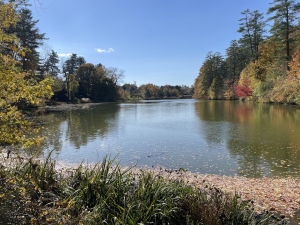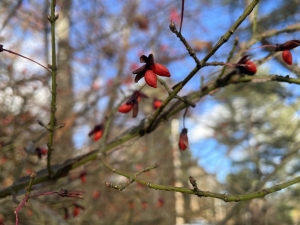
Behind the Scenes of PSYC 40: Computational Neuroscience
Let me take you on a woccom today and tell you about my favorite class this term: Computational Neuroscience. Before we dive into the academics, though, What's a woccom again?
"Woccom" is the Dartmouth term for a walk around Occom Pond, a nice pond at the north end of campus, right near Pine Park. I sometimes go on woccoms alone (I went on one this Friday and was inspired to include it in this blog post), though most times I go with a friend. Woccoms make for really good "podcast" conversations. In any case, woccoms hold a special place in Dartmouth students' hearts.

PSYC 40: Computational Neuroscience is a class offered by three departments: the Computer Science Department, the Cognitive Science Department, and the Psychological and Brain Sciences (PBS) Department. It's a multidisciplinary course taught by a multidisciplinary professor, designed for multidisciplinary thinkers. Professor Richard Granger often reminds us that even though he teaches in the neuroscience department, his PhD was in computer science.
The first part of the class is dedicated to the brain: its evolution, physiology and anatomy, and the mechanisms that govern learning. I'm a neuroscience major, so I found this part of the class very interesting but not too difficult. As Professor Granger says, the first part of the class is easy for the biologists (who are okay with all the convoluted details of biology that baffle engineers).

The third part of the course is a mix of the first two—we're now looking at brain systems and comparing their performance and architecture to artificial networks. Supposedly, this part of the class will be difficult for both the biologists and programmers. Only now I appreciate how difficult (yet very inspiring) Professor Granger's job is: he looks at a biological system like the paleocortex (responsible for olfaction/smell), recognizes the rules it follows, and finds a way to explain it all, so we can understand it. He sees the math and algorithms in the messy world of biology, and I find this a fascinating skillset without which you couldn't understand or even marvel at the efficient algorithms evolution has come up with that just strike you with their elegance.
I've long considered myself a biologist (to the disdain of my mom, who's a programmer herself and finds it difficult appreciate any other vocation but the programmer's), but PSYC 40 has been teaching me how to think like both a biologist and a programmer and how to think about science itself. All thanks to Professor Granger's pearls of life wisdom mixed with his unreplicable humor. I'd recommend taking his class just to be in his presence for a bit.
PS: The header picture for this blog post is the Dartmouth Outing Club house which overlooks Occom Pond from the north.
















